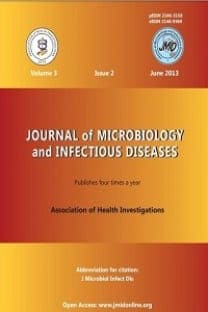Tigecycline Resistance among Clinical Isolates of Staphylococcus aureus from North-east India
Tigecycline tet genes, Staphylococcus aureus, North-east India,
___
- 1. Scheinfeld N. Tigecycline: a review of a new glycylcycline antibiotic. J Dermatol Treatment 2005; 16: 207-212. 2. Bauer G, Berens C, Projan SJ, Hillen W. Comparison of tetracycline and tigecycline binding to ribosomes mapped by dimethylsulphate and drug directed Fe2+ cleavage of 16S rRNA. J Antimicrob Chemother 2004; 53: 592-599. 3. Hope R, Mushtaq S, James D, Pllana T, Warner M, Livermore DM. Tigecycline activity: low resistance rates but problematic disc breakpoints revealed by a multicentre sentinel survey in the UK. J Antimicrob Chemother 2010; 65: 2602-2609. 4. Babu NGR, Shree GBB, Rekha L, Karthiga P. Molecular analysis of Coagulase (coa) gene polymorphism in clinical isolates of Staphylococcus aureus by PCR-RFLP. Int J Innov Res Sci Engin Technol 2014; 3: 8163-8168. 5. Behera B, Das A, Mathur P, Kapil A, Gadepalli R, Dhawan B. Tigecycline susceptibility report from an Indian tertiary care hospital. Indian J Med Res 2009; 129: 446-450. 6. Chopra I, Roberts M. Tetracycline antibiotics: mode of action, applications, molecular biology, and epidemiology of bacterial resistance. Microbiol Mol Biol Rev 2001; 65: 232-260. 7. Costa AR, Batistao DWF, Ribas RM, Sousa AM , Pereira MO, Botelho CM. Staphylococcus aureus virulence factors and disease. Microbial pathogens and strategies for combating them: science, technology and education. Formatex 2013; 702-710. 8. Hookey JV, Richardson JF, Cookson BD. Molecular Typing of Staphylococcus aureus based on PCR Restriction Fragment Length Polymorphism and DNA Sequence Analysis of the Coagulase Gene. J Clin Microbiol 1998; 36: 1083-1089. 9. Clinical and Laboratory Standards Institute. Performance Standards for Antimicrobial Susceptibility Testing: Twenty-Fourth Informational Supplement M100-S24.CLSI, Wayne, PA, USA, 2014. 10. U. S. Food and Drug Administration. Wyeth Pharmaceuticals Inc. Philadelphia, PA 19101 W10521C005 ET01 Rev 12/08. NDA 21-821/S-016: 3-21. 11. Duran N, Ozer B, Duran GG, Onlen Y, Demir C. Antibiotic resistance genes & susceptibility patterns in staphylococci. Indian J Med Res 2012; 135: 389-396. 12. Trzcinski K, Cooper BS, Hryniewicz W, Dowson CG. Expression of resistance to tetracyclines in strains of methicillin-resistant Staphylococcus aureus. J Antimicrob Chemother 2000; 45: 763-770. 13. Schmitz FJ, Krey A, Sadurski R, Verhoef J, Milatovic D, Fluit C. Resistance to tetracycline and distribution of tetracycline resistance genes in European Staphylococcus aureus isolates. J Antimicrob Chemother 2001; 47: 239-240. 14. Huys G, Haene KD, Eldere JV, Holy AV, Swings J. Molecular Diversity and Characterization of Tetracycline-Resistant Staphylococcus aureus Isolates from a Poultry Processing Plant. Appl Environm Microbiol 2005; 71: 574-579. 15. Bismuth R, Zilhao R, Sakamoto H, Guesdon JL, Courvalin P. Gene heterogeneity for tetracycline resistance in Staphylococcus spp. Antimicrob Agents Chemother 1990; 34: 1611-1614. 16. Shittu AO, Okon K, Adesida S, et al. Antibiotic resistance and molecular epidemiology of Staphylococcus aureus in Nigeria. BMC Microbiol 2011; 11: 92 17. Werner G, Gfrorer S, Fleige C, Witte W, Klare I. Tigecycline-resistant Enterococcus faecalis strain isolated from a German intensive care unit patient. J Antimicrob Chemother 2008; 61:1182-1183.
- ISSN: 2146-3158
- Yayın Aralığı: 4
- Başlangıç: 2011
- Yayıncı: Sağlık Araştırmaları Derneği
Yu Jun Wong, Bee Xian Tan, Maciej Piotr Chlebicki, Brian John Schwender
Swati Sharma, Deepshikha Bhowmik, Amitabha Bhattacharjee
Christine SCARSBROOK, Nadeem Sajjad RAJA, Michael HARDMAN, Kath HUGHES
Shree DHOTRE, Basavraj NAGOBA, Milind DAVANE, Mahesh DHARNE, Namdev SURYAWANSHİ
Nadeem Sajjad Raja, Albena Nikolova, Theo Raudsepp, Simon G Weston- Smith, Annette Rumbold, Sunil Gupta
Elda QYRA, Edmond PUCA, Arjan HARXHİ, Majlinda KOTE, Pellumb PİPERO
Arturo González Raya, Eva Martín Salido, Miguel Cantero Sánchez, Gonzalo Callejón Martín, María L. Hortas Nieto
N. Dhaneshwor Singh, Nishi Sharma, Lobzang Dawa, Shalini Malhotra
Parul Punia, Anita Chakravarti, Anjar Ashraf
Francesca DİCKHAUS, Mutasim Abu HASAN, Elizabeth TREMBLAY, Kenneth KLİNKER, Kenneth RAND, Stacy G. BEAL
